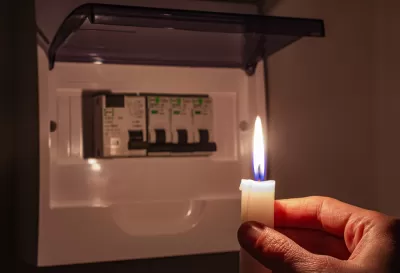In areas served by PG&E, new developments sometimes have to wait months before the utility will turn on the power, creating extra costs for builders and keeping new affordable housing units off the market.

“Hundreds of residential and commercial projects face monthslong waits to get electricity in Northern California at a time when state leaders are touting an unprecedented, climate change-driven overhaul of the way power is produced and used,” reports Wes Venteicher in Politico. Planetizen recently amplified a similar story from the San Francisco Chronicle, which sounded the alarm on the issue.
Causes of the delays include “a troubled utility, a tight labor market and aging infrastructure,” all of which could contribute to a growing crisis. The state’s beleaguered Pacific Gas & Electric (PG&E) utility, which provides service to roughly 16 million people in northern and central California, has been contending with a series of catastrophes and natural disasters. “Across its territory, 319 commercial and multifamily buildings were awaiting electricity connections as of February, according to Public Utilities Commission data provided to state Sen. Scott Wiener (D-San Francisco),” with 95 waiting for over three months.
Notably, these wait times are significantly longer than those for other utilities in the state such as Southern California Edison and San Diego Gas and Electric. “The delays, besides raising concerns about PG&E and the broader transition, drive up construction costs in a state trying to encourage new housing and create jobs that pay enough to afford rent.” The delays have raised the cost of construction by $41 million for at least nine affordable housing developments in San Francisco, said the mayor’s office in a recent memo.
Senator Scott Wiener is proposing legislation to penalize utilities that take longer than eight weeks to provide power, which, if passed, would inject some certainty into a volatile process.
FULL STORY: Need power in California? Get in line.

Planetizen Federal Action Tracker
A weekly monitor of how Trump’s orders and actions are impacting planners and planning in America.

Congressman Proposes Bill to Rename DC Metro “Trump Train”
The Make Autorail Great Again Act would withhold federal funding to the system until the Washington Metropolitan Area Transit Authority (WMATA), rebrands as the Washington Metropolitan Authority for Greater Access (WMAGA).

The Simple Legislative Tool Transforming Vacant Downtowns
In California, Michigan and Georgia, an easy win is bringing dollars — and delight — back to city centers.

The States Losing Rural Delivery Rooms at an Alarming Pace
In some states, as few as 9% of rural hospitals still deliver babies. As a result, rising pre-term births, no adequate pre-term care and "harrowing" close calls are a growing reality.

The Small South Asian Republic Going all in on EVs
Thanks to one simple policy change less than five years ago, 65% of new cars in this Himalayan country are now electric.

DC Backpedals on Bike Lane Protection, Swaps Barriers for Paint
Citing aesthetic concerns, the city is removing the concrete barriers and flexposts that once separated Arizona Avenue cyclists from motor vehicles.
Urban Design for Planners 1: Software Tools
This six-course series explores essential urban design concepts using open source software and equips planners with the tools they need to participate fully in the urban design process.
Planning for Universal Design
Learn the tools for implementing Universal Design in planning regulations.
Smith Gee Studio
City of Charlotte
City of Camden Redevelopment Agency
City of Astoria
Transportation Research & Education Center (TREC) at Portland State University
US High Speed Rail Association
City of Camden Redevelopment Agency
Municipality of Princeton (NJ)





























